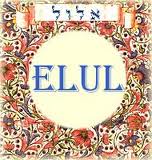
At the end of the day, there is really nothing to make up our minds about. When it comes to the issue of perfection, it’s all about holding the paradox. On the one hand we must love and accept ourselves, botched imperfections and all. And on the other hand, we are compelled to pursue self-betterment, to practice, to improve.
Perfection’s paradox is an apt teaching for this month of Elul. Elul is the boot-camp that builds us up for the impending High Holidays. Our tradition teaches that the task this month is to do ‘teshuva’, to seek out our blemishes, to work mightily to improve, to PERFECT, ourselves.
And yet, simultaneously, we see that the themes of this month are those of love, acceptance. Elul is read as an acronym, “Ani L’dodi v’dodi li. - I am my beloved’s and my beloved is mine." We are the ones beloved by God! It is also said that this is the time when “the King is in the field”. We are to see ourselves as the doted-upon children of that majestic King, now so close at hand.
In Elul we are at once called to self-critique and improvement, as well as assured of our lovability, our royalty, our essential goodness and godliness.
As a psychotherapist, this paradox reminds me of my therapeutic work. Carl Rogers posits that the therapist is to maintain an inner-orientation of genuineness, empathy and unconditional positive regard for their client. According to humanistic psychology, these are the mainstays of a truly healing relationship. And yet, there is a contradiction inherent in this stance. A contradiction between genuineness and unconditional positive regard. For, if I am to be utterly genuine about my feelings, then I will inevitably notice an occasional, or not so occasional, reaction of distaste to something that my client shares. Does that negativity demolish my unconditional positive regard?
How can I hold both an acknowledgement of imperfection, while maintaining an unconditionally positive view of the person before me? For me, the point is not to resolve this conflict, but rather to rest in the conflict and to reap its subtle rewards. For I believe that the graceful holding of this paradox is at the heart of all truly healing relationships, whether with clients, partners, friends…or ourselves.
Elul offers us the opportunity to seek out imperfections, to pursue improvement. It also teaches us that the best context for improvement is a context of love, of unconditional positive regard. For when we are rooted in the knowledge that we are the beloved of God, the very children of divinity, then we can face our imperfections with greater courage and work on ourselves with stronger tenacity and faith. When we truly believe in the essential goodness of ourselves and others then we can behold the imperfections with gentleness, and with more agility to improve them.
This Elul we are invited to hold the paradox of perfection, the knowledge that our imperfections are perfectly crafted gifts from beyond.
 RSS Feed
RSS Feed
